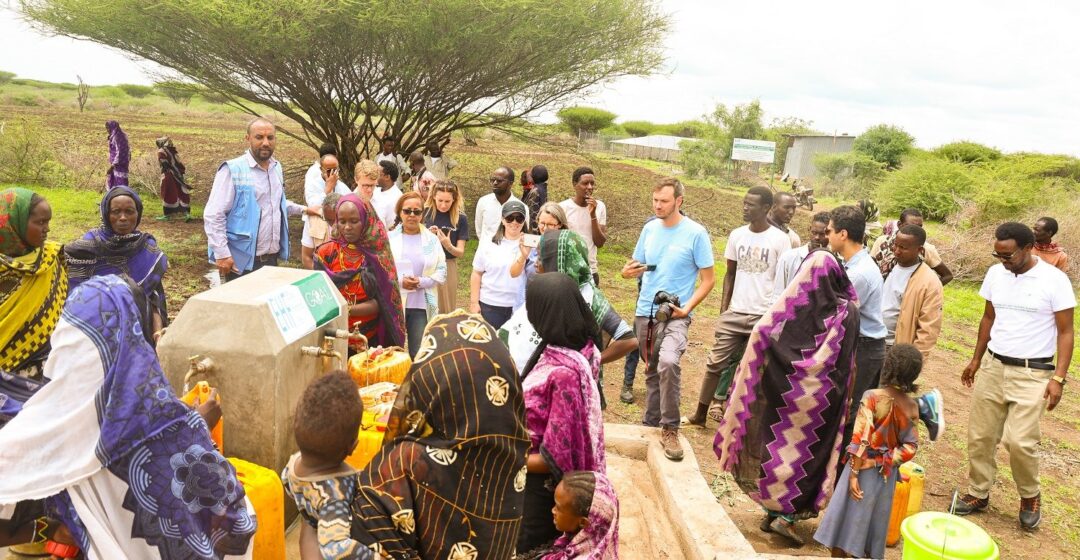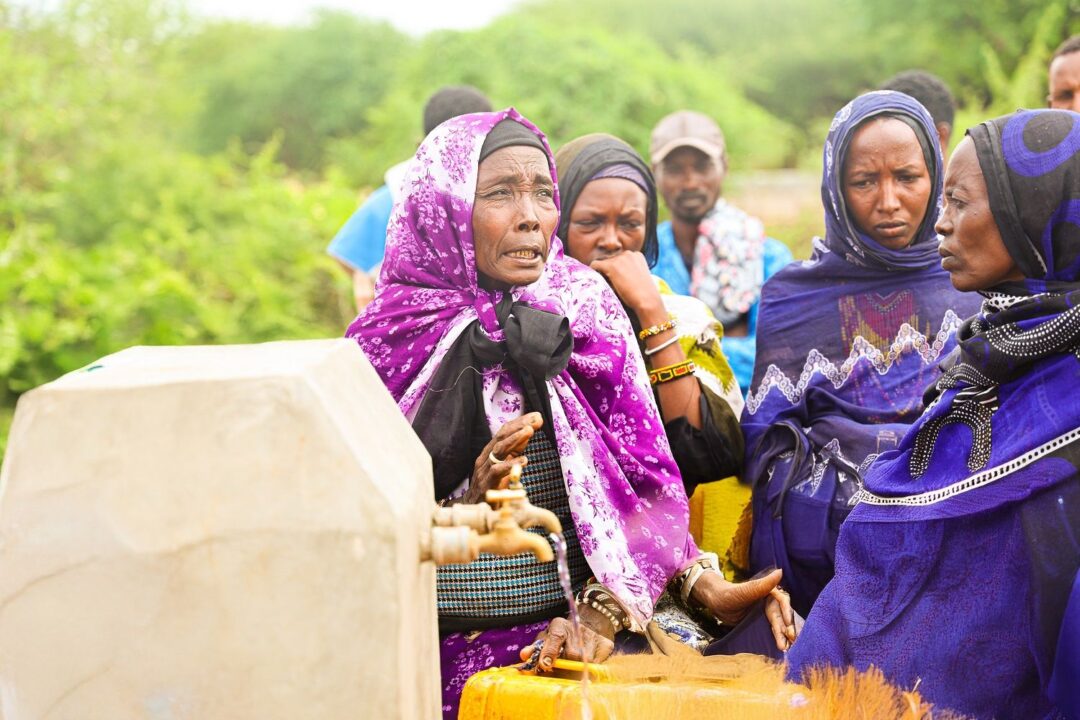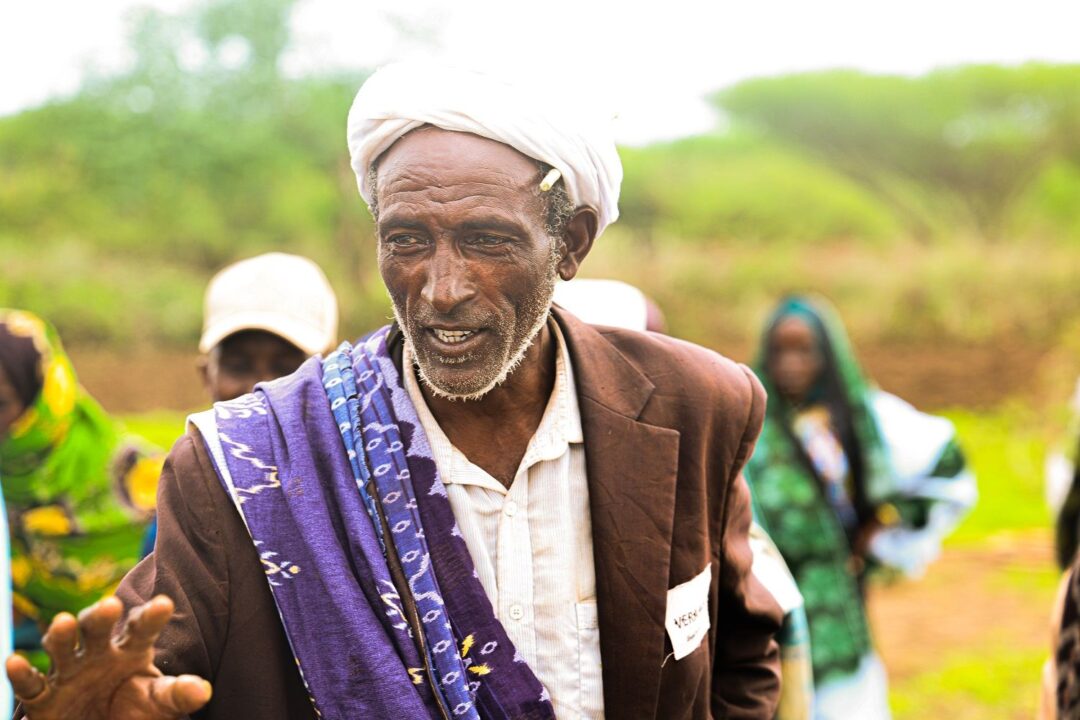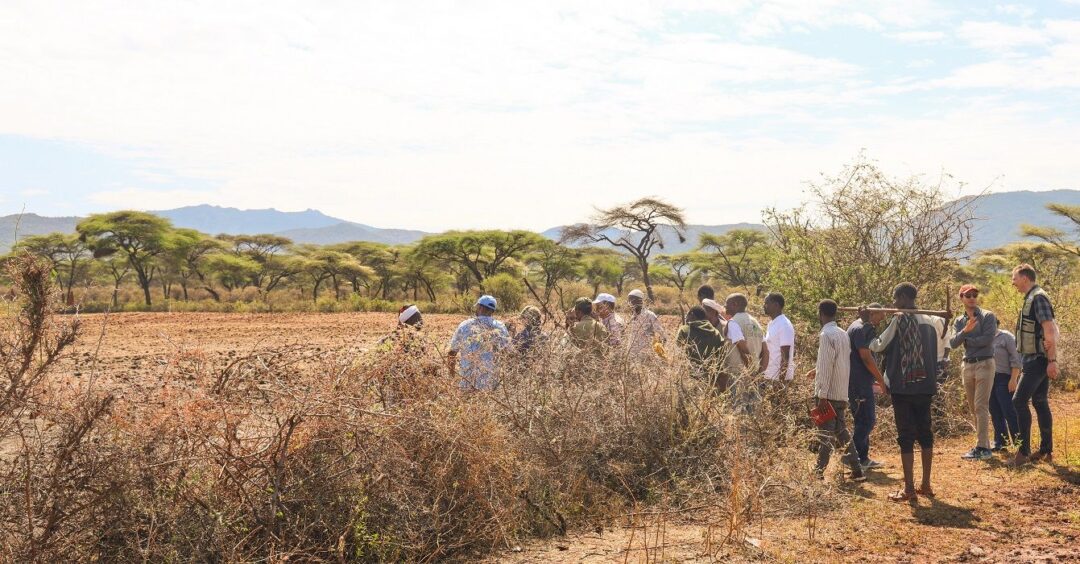 Stories
Stories
April 9, 2025 • 4 min read
In Ethiopia’s Borena Zone, escalating droughts, exacerbated by climate change, are ravaging communities, decimating livestock, and draining vital water sources. In response, GOAL, with support from the Ethiopia Humanitarian Fund (EHF), is leading anticipatory action projects aimed at helping vulnerable communities regain stability and build resilience. In March, GOAL hosted representatives from various donor embassies in Borena, allowing them to witness the impact of these efforts and emphasising the importance of sustained collaboration for long-term solutions.
The Human Impact: The Drought’s Devastation in Borena
In Ethiopia’s Borena Zone, drought is becoming more frequent and severe, fuelled by the La Niña climate phenomenon. This global weather pattern, brought about by changes in global temperatures, cools Pacific Ocean temperatures, disrupting rainfall and leaving lowland regions like southern Ethiopia exposed to prolonged dry spells. Two years ago, these weather patterns brought periods of prolonged drought to the Borena Zone, devastating the districts and leading to the loss of over 60% of livestock. The ramifications of this loss can still be felt today, as these communities have become increasingly vulnerable to minor shocks.
An elder of the community, Golo Kita, shared how the lack of water had disproportionately affected women, saying, “Pregnant mothers were among the most affected. They had to carry 20-liter jerrycans for two hours. It was a very serious situation. It was a daily struggle even for elders without children to help them.”

GOAL’s Response: A Game-Changer for Communities
As climate change worsens, these extreme droughts are expected to increase in frequency and severity. To help communities prepare for these harsh conditions, GOAL has launched anticipatory projects aimed at reducing the impact of drought before it strikes. In late 2024 and early 2025, with generous funding from the Ethiopia Humanitarian Fund (EHF), GOAL implemented a range of projects in the Tigray, Afar, and Oromia regions to address the immediate needs of those affected by drought and food insecurity. These efforts focused on nutrition and health, water and sanitation, and livelihood support through multipurpose cash distributions.
GOAL’s anticipatory action project has supported nearly 900 households with multipurpose cash assistance. As part of the intervention, 105 female-led households received four goats each, enabling them to rebuild their lost livestock assets. Additionally, $250 (approximately €225) was injected into 30 women-led small businesses, each of which had ceased operations due to the drought, helping them restart their enterprises.
Through Nutrition and Health interventions, GOAL also facilitated the treatment of 103 children suffering from acute malnutrition and severe acute malnutrition within just three months, ensuring lifesaving support reached those most in need.

Water and Sanitation Challenges and Solutions
One of the most pressing challenges in Borena has been access to clean water. Communities previously relied on diesel-powered generators to pump water, but the high costs and frequent maintenance issues forced communities to pay between $40 and $50 (approximately €36-€45) regularly to power the generators. When fuel was unavailable, they had to travel over 26 kilometres to fetch water, often spending up to four hours on a round trip.
To address this, GOAL converted the diesel-powered water system into a solar powered one, ensuring a sustainable and cost-effective solution. The rehabilitated water scheme now includes water distribution points, washing stations, showers, and animal drinking troughs. As a result, clean water is now readily available in the community, eliminating the struggle that once defined daily life for many of the community’s families.

Diplomatic Engagement: The Embassy Delegates’ Visit
Last month, the Ethiopia Humanitarian Fund (EHF) organised a field visit for delegates from various embassies to witness the impact of EHF-supported projects firsthand. GOAL’s initiatives were among those showcased, marking a pivotal step toward fostering greater understanding and a more effective multilateral response to the region’s challenges.
From March 24–26, 2025, delegates from the embassies of Canada, Germany, Ireland, Italy, the Netherlands, Norway, and Sweden visited GOAL-implemented projects in Borena, funded by EHF. During the three-day visit, they engaged with zonal administration representatives to gain direct insight into the ongoing humanitarian situation.
Local officials recognised the government’s efforts to support affected communities but emphasised that the scale of the crisis exceeds local capacities. They highlighted the urgent need for a coordinated response that includes both national and international actors.
By promoting this unified approach, GOAL plays a critical role in ensuring an effective and collaborative response to the ongoing drought, which continues to threaten lives and livelihoods across the region.

Voices from the Community
Reflecting on the positive impact of the initiative, Duche Doba, a community elder, stated, “This area, Kanchero Kebele, has long suffered from a lack of clean water. It affected our daily lives in many ways. Thanks to this support, we can now access clean water right in our village.”
GOAL Ethiopia’s Programme Director, Gizaw Tadesse, stated, “We deeply appreciate our longstanding partnership with EHF in delivering critical, life-saving interventions to communities affected by both human-made and natural crises. We are also grateful for EHF’s commitment to facilitating field visits for delegates to witness firsthand the impact of ongoing humanitarian projects. We look forward to strengthening this collaboration to reach even more communities in need.”
With continued support and anticipatory actions, Borena’s communities are not only recovering but building resilience for the future. They are better equipped to withstand future crises and rebuild their livelihoods with improved access to essential resources.
